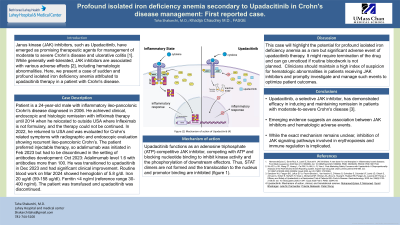Sunday Poster Session
Category: IBD
P1009 - Profound Isolated Iron Deficiency Anemia Secondary to Upadacitinib in Crohn's Disease Management: First Reported Case
Sunday, October 27, 2024
3:30 PM - 7:00 PM ET
Location: Exhibit Hall E

Has Audio

Taha Shakarchi, MD, MBChB
Lahey Clinic
Burlington, MA
Presenting Author(s)
Taha Shakarchi, MD, MBChB
Lahey Clinic, Burlington, MA
Introduction: Janus kinase (JAK) inhibitors, such as upadacitinib, have emerged as promising therapeutic agents for management of moderate to severe crohn’s disease and ulcerative colitis. While generally well-tolerated, JAK inhibitors are associated with various adverse effects including hematologic abnormalities. Here, we present a case of sudden and profound isolated iron deficiency anemia attributed to upadacitinib therapy in a patient with crohn's disease.
Case Description/Methods: Patient is a 24-year-old male with inflammatory ileo-pancolonic Crohn's disease diagnosed in 2006. He achieved clinical, endoscopic and histologic remission with infliximab therapy until 2014 when he relocated to outside USA where Infleximab is not formulary and the therapy could not be continued. In 2022, he returned to USA and was evaluated for Crohn’s related symptoms with radiographic and endoscopic evaluation showing recurrent ileo-pancolonic Crohn’s. The patient preferred injectable therapy, so adalimumab was initiated in Feb 2023 but had to be discontinued in the setting of antibodies development: Oct 2023: Adalimumab level 1.6 with antibodies more than 100. He was transitioned to upadacitinib in Dec 2023. He had significant clinical improvement. Routine blood work on Mar 2024 showed hemoglobin of 5.8 g/dl. Iron 20 ug/dl (59-158 ug/dl). Ferritin < 4 ng/ml (reference range 30-400 ng/ml). The patient was transfused and upadacitinib was discontinued.
Discussion: Upadacitinib, a selective JAK inhibitor, has demonstrated efficacy in inducing and maintaining remission in patients with moderate-to-severe Crohn's disease [3]. However, emerging evidence suggests an association between JAK inhibitors and hematologic adverse events. While the exact mechanism remains unclear, inhibition of JAK signaling pathways involved in erythropoiesis and immune regulation is implicated. This case highlights the potential for profound isolated iron deficiency anemia as a rare but significant adverse event of upadacitinib therapy that may require termination of the drug and can go unnoticed if routine bloodwork is not planned. Clinicians should maintain a high index of suspicion for hematologic abnormalities in patients receiving JAK inhibitors and promptly investigate and manage such events to optimize patient outcomes.
Disclosures:
Taha Shakarchi, MD, MBChB. P1009 - Profound Isolated Iron Deficiency Anemia Secondary to Upadacitinib in Crohn's Disease Management: First Reported Case, ACG 2024 Annual Scientific Meeting Abstracts. Philadelphia, PA: American College of Gastroenterology.
Lahey Clinic, Burlington, MA
Introduction: Janus kinase (JAK) inhibitors, such as upadacitinib, have emerged as promising therapeutic agents for management of moderate to severe crohn’s disease and ulcerative colitis. While generally well-tolerated, JAK inhibitors are associated with various adverse effects including hematologic abnormalities. Here, we present a case of sudden and profound isolated iron deficiency anemia attributed to upadacitinib therapy in a patient with crohn's disease.
Case Description/Methods: Patient is a 24-year-old male with inflammatory ileo-pancolonic Crohn's disease diagnosed in 2006. He achieved clinical, endoscopic and histologic remission with infliximab therapy until 2014 when he relocated to outside USA where Infleximab is not formulary and the therapy could not be continued. In 2022, he returned to USA and was evaluated for Crohn’s related symptoms with radiographic and endoscopic evaluation showing recurrent ileo-pancolonic Crohn’s. The patient preferred injectable therapy, so adalimumab was initiated in Feb 2023 but had to be discontinued in the setting of antibodies development: Oct 2023: Adalimumab level 1.6 with antibodies more than 100. He was transitioned to upadacitinib in Dec 2023. He had significant clinical improvement. Routine blood work on Mar 2024 showed hemoglobin of 5.8 g/dl. Iron 20 ug/dl (59-158 ug/dl). Ferritin < 4 ng/ml (reference range 30-400 ng/ml). The patient was transfused and upadacitinib was discontinued.
Discussion: Upadacitinib, a selective JAK inhibitor, has demonstrated efficacy in inducing and maintaining remission in patients with moderate-to-severe Crohn's disease [3]. However, emerging evidence suggests an association between JAK inhibitors and hematologic adverse events. While the exact mechanism remains unclear, inhibition of JAK signaling pathways involved in erythropoiesis and immune regulation is implicated. This case highlights the potential for profound isolated iron deficiency anemia as a rare but significant adverse event of upadacitinib therapy that may require termination of the drug and can go unnoticed if routine bloodwork is not planned. Clinicians should maintain a high index of suspicion for hematologic abnormalities in patients receiving JAK inhibitors and promptly investigate and manage such events to optimize patient outcomes.
Disclosures:
Taha Shakarchi indicated no relevant financial relationships.
Taha Shakarchi, MD, MBChB. P1009 - Profound Isolated Iron Deficiency Anemia Secondary to Upadacitinib in Crohn's Disease Management: First Reported Case, ACG 2024 Annual Scientific Meeting Abstracts. Philadelphia, PA: American College of Gastroenterology.
